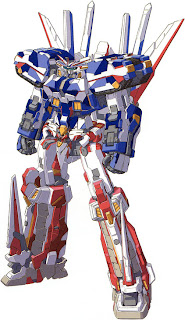"I'm playing Super Robot Wars: A Portable," I replied, after a time.
The Super Robot Wars series celebrated its 20th anniversary earlier this year. Its origins are in what now seems like the Triassic period of console and handheld history, on the original Game Boy. Banpresto, a Japanese game development studio (and current subsidiary of Namco-Bandai) created the series out of a love for the mecha genre, which I've gone over before. Basically, they loved giant robots. The game was a strategy role-playing game, a style that is already in one of the dark sub-ghettos of game genres; basically you field a team of robots on a square grid and move them around attacking the enemies, not unlike how Chess might look if you played on a chessboard with a mountain background and a couple of spreadsheets open. It featured characters and robots from multiple classic super robot shows that had aired in Japan in a crossover game where the heroes of each series fought their respective villains as part of a unified force.
 |
| The Dis Astranagant, from Super Robot Wars: Alpha 3. |
If this sounds incredibly nerdy you've been paying proper attention. Super Robot Wars is for true specialists in geekery; you have to know Japanese (because while Japanese copyright law is fairly lenient, once you factor in the license agreements with the various American production companies the costs become too prohibitive to be able to get every show's right under one translation house's roof, and the returns wouldn't nearly cover it), you have to be willing to import the games from Japan (easier nowadays), you have to be willing to mod your console for certain games (or buy a Japanese console; while the DS or PSP are region free, the PS2 is not, so if you want to play Super Robot Wars: Alpha 3, you must, as I did, use SwapMagic or a similar solution), and you have to be familiar enough with the shows involved to have an emotional investment, as well as enjoy SRPGs in the first place.
 |
| Valzacard, from Super Robot Wars W. |
As with all niche things, however, for those who are fully poised to understand most/all of the things going on in these games. The games are made by real fans of the genre, and when they work, they really work, hitting those same notes that make watching these shows fun for me in repeatable game form. They can also fix some things that didn't quite work on the original show, due to budget constraints or voice actor obligations or just the sheer time crunch of the production schedule, and they allow for interaction between members of various series, as befits a crossover game. This allows for alternate scenarios where tragedies are averted or their impact slightly lessened, and while this may rob the individual stories of their power, it can often offer a deepening of the themes (which admittedly are often shallow, given that we're usually dealing with middling-to-well-done genre fictional guilty pleasures).
The games themselves make me wish that American companies were more willing to engage in this kind of freeform creativity with licensed properties. Occasionally we see that kind of spirit, with games like the Marvel vs. Capcom fighting games (although tellingly this doesn't involve more than one American company; a comic book game with not only the Big Two of Marvel and DC but also other lesser known superhero universes would be amazing, as nerdy as it is incredibly unlikely to ever exist) or Mortal Kombat vs. DC. However, we closely guard our intellectual property and the rights to license it, and while Japanese company seem to regard the games as free publicity even if the properties featured in the games aren't controlled by Namco-Bandai, American companies take a dimmer view of the whole matter. And, on the flip side, the Super Robot Wars games are unlikely to make much more headway than they have into the American market. Three games have been translated, all dealing with original characters that debuted in Japan-only SRW titles; one of these was a pretty awful cash-grab title that doesn't play like the rest of the series, and the other two, Original Generation 1 and 2, have their own problems. They're part of a series that debuted on the Game Boy Advance, a largely dead platform despite the fact that the Nintendo DS will play GBA titles. They feature the afore-mentioned original characters, but the first game relies on you to have already played at least some of the games the characters originated in, and doesn't give you the exposition necessary to really form an attachment to them. And, while OG2 is a damn fun game in its own right, OG1 is fairly archaic by 2011 standards, and the plot isn't really recapped going into the second game, making the entire experience fairly impenetrable (and this is all notwithstanding the fact that the turn-based strategy RPG is not a terribly popular genre in America).
 |
| SRX stands for Super Robot X-Type. |
To which I can only reply, real men ride each other.
This is amazing. You are amazing. Remember that time I said we should get together and become gaming apologists? Never mind, you are already better at it than I could hope to be.
ReplyDeleteHave I mentioned that you are awesome? I have a geeky friend, (yes, only one) and I am going to forward this to her to see if she gets it.
ReplyDeleteI just clicked on the link at the end of this, and it's been removed due to copyright infringement. I literally loled.
ReplyDelete